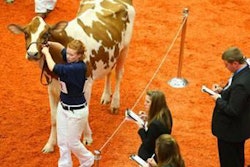Pigs and poultry are fully capable of synthesizing enough vitamin C (ascorbic acid), a naturally occurring metabolite of glucose, to meet normal daily needs. Nevertheless, there is sufficient evidence today to suggest that pigs and poultry given vitamin C may benefit under certain conditions.
Duress, immune system support
The metabolic functions of vitamin C are many and important, including free radical detoxification, vitamin E rejuvenation, collagen, norepinephrine and carnitine biosynthesis, and neurotransmitter and metal ion metabolism. Also, vitamin C plays a significant role in the functionality of the immune system-and this area of research is drawing considerable attention.
During periods of stress, for example, early weaning, excessive heat, disease challenge, fighting and crowding body stores of vitamin C can be quickly depleted, and high concentrations of vitamin C metabolites are excreted in urine. This drop in the plasma concentration of vitamin C under adverse conditions is evidence of either an insufficient biosynthesis rate during the period of stress, or an increased requirement for vitamin C to surpass the negative effects of stress factors. Most likely, it is a combination of both factors that create an apparent vitamin C deficiency under conditions of duress.
In addition, as natural vitamin C is sensitive to a variety of environmental factors including heat, oxygen and alkalinity, some losses are inevitable during feed manufacturing, storage and feeding. Thus, any natural vitamin C in raw materials is unlikely to remain bioavailable for long. The same applies when unprotected vitamin C is used as an additive. To this effect, protected forms are the norm in the industry, and albeit more expensive, they are the only alternative to rapid losses of unprotected forms.
Poultry, pig vitamin C benefits
Today, under commercial conditions vitamin C often is added to broiler diets during the summer months, and in some cases diets for layers including breeders to combat heat stress. Some evidence supports the use of vitamin C in broiler breeder diets throughout the year, but this remains equivocal.
For pigs, vitamin C often is used in post-weaning diets, and in summer booster packs for lactating sows to combat the negative effects of heat stress on feed intake. Lately, vitamin C has been included in diets for stud boars as it has shown to improve semen quality. Although feed is the desired venue of supplementation, under severe heat conditions when feed intake drops, it often is advisable to administer vitamin C through drinking water.
Vitamin C is currently being used mostly as a heat-stress additive, whereas its potential beneficial effects on immunity are largely ignored because research remains inconclusive. Even its role as an additive against heat stress is not universally accepted, as other additives compete for the same role, often with more success. At the end, each nutritionist based on personal experience will have formed a personal opinion on the use of vitamin C; as it happens with most additives, anyway.















